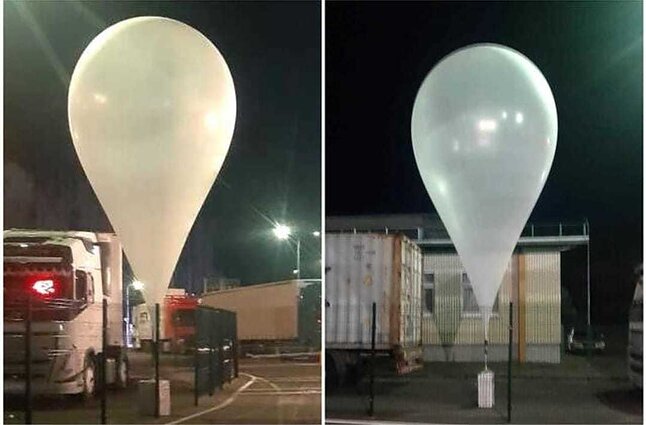Lithuania will close its border with Belarus “for an indefinite period” and authorise the military to shoot down balloons entering its airspace, after three consecutive nights of flight disruptions at Vilnius and a fourth shutdown within a week.
Prime Minister Inga Ruginienė announced the measures on Monday following a meeting of the National Security Commission.
Officials say the balloons, launched from Belarus and typically used by smuggling networks to move contraband cigarettes into the EU, have repeatedly appeared over Lithuanian territory, forcing precautionary closures of airport airspace. Operations at Vilnius were halted for several hours on Friday and Saturday nights, and again from Sunday evening into Monday. Lithuania’s airports reported that more than 100 flights were disrupted over the weekend, affecting over 16,000 passengers.
Border authorities also temporarily closed the two functioning road crossings with Belarus during the incidents, a step the government now plans to formalise on a longer-term basis. Exemptions will apply for diplomats and for Lithuanian and EU citizens returning home, according to statements relayed by local media and international wire services.
Ruginienė said Lithuania would introduce “kinetic measures” against the balloons and confirmed that the armed forces had a defined engagement procedure in place. She did not disclose specific systems or munitions but stated that airspace incursions would be countered under a newly agreed operational algorithm.
The government is also weighing recourse to NATO’s Article 4, which allows any member to request consultations when it perceives a threat to its security. Ruginienė indicated that consultations with allies and with neighbouring Poland and Latvia are ongoing, and that a coordinated European response is being prepared.
Lithuania has formally protested to Minsk over the airspace violations, accusing the Belarusian authorities of failing to prevent the launches. Officials in Vilnius characterise the pattern as a hybrid pressure tactic that exploits the safety rules governing civil aviation. The National Crisis Management Center said “tens of objects” were detected on radar during the latest episode, prompting risk-based closures to keep traffic away from potential hazards.
The shutdowns have had a visible impact on travel. Vilnius Airport reported suspensions beginning at 21:35 on Saturday and lasting until 03:30 on Sunday, with four cancellations and seven diversions that night alone. Friday’s disruption, of similar duration, affected both Vilnius and Kaunas, leading to additional cancellations and diversions. Sunday night’s closure extended into the early hours of Monday, with dozens of flights delayed or rerouted.
While Lithuanian authorities emphasise that the balloons have so far been associated with contraband rather than surveillance or kinetic payloads, they argue that their unpredictable trajectories and altitudes pose unacceptable risks near airports and airways. Data released by the government and reported by local and international outlets indicate that Lithuania recorded hundreds of such incursions in recent years, with a spike this month prompting the more stringent response.
Further domestic measures are being prepared. The Cabinet will submit amendments to the Criminal Code this week to introduce custodial sentences for smuggling-related offences tied to the balloon incidents, replacing or augmenting existing fine-based penalties. The Interior Ministry and the State Border Guard Service (VSAT) are coordinating with police on targeted enforcement against organisers and facilitators within Lithuania.
Ruginienė also signalled work on an additional EU sanctions package aimed at Belarus. Vilnius is consulting partners in Brussels on options intended to raise the cost of organised smuggling operations and to deter further provocations. Coordination with Poland and Latvia will include aligned border and aviation risk measures to reduce displacement effects along the frontier.
The decision to close the border and authorise the downing of balloons marks a significant escalation in Lithuania’s response to airspace safety incidents attributed to actors operating from Belarus. It follows earlier temporary closures of the Šalčininkai and Medininkai crossings and a cycle of airport shutdowns across multiple nights. Officials say the objective is to restore predictable civil aviation operations while signalling that repeated airspace violations will draw immediate and concrete countermeasures.
Regional tensions have been elevated by related airspace issues this month, including Lithuanian reports of a Russian military aircraft incursion from Kaliningrad that prompted a NATO air policing scramble, though that event is distinct from the balloon episodes. The government maintains that Lithuania remains in close contact with allies and will calibrate its response within NATO and EU frameworks as the situation develops.
With the border move and new engagement rules now set, authorities say the priority is to maintain flight safety, deter further launches from across the border and pursue criminal accountability for those involved in the smuggling chains. The government has indicated that the measures will be reviewed in light of operational results and allied consultations.
Image source: lrt.lt
Russian Su-30 and Il-78 briefly enter Lithuanian airspace; NATO jets scrambled


